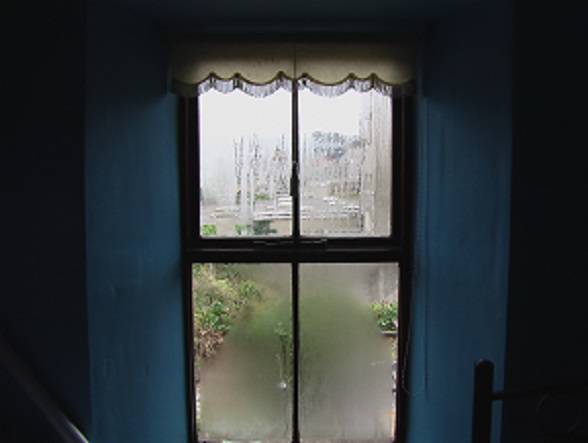Raccoon Removal Strategies: How To Keep Raccoons Away From Your Property
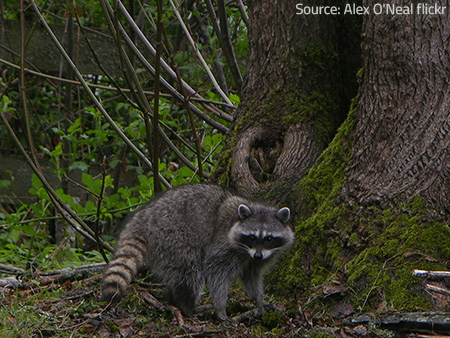
Raccoons are truly adorable in the wild.
This world was created as a perfect symphony where every living being has its place, its purpose, and its splendor. Plants and animals, prey and predators – all contribute to the never-ending circle of life.
However, when a critter violates our living space, there is a problem. The little intruders are indeed responsible for a number of severe problems, varying from health threats to damaged property. Insects may transfer diseases or induce allergies, rodents may cause bio-hazardous contaminationContamination is the presence of harmful or unwanted substan... More and often carry virusesViruses are microscopic infectious agents that can only repr... More that can infect people or pets, many reptiles are poisonous, and so on. As a result, even ardent animal lovers are forced to take measures and get rid of the perilous pests when needed.
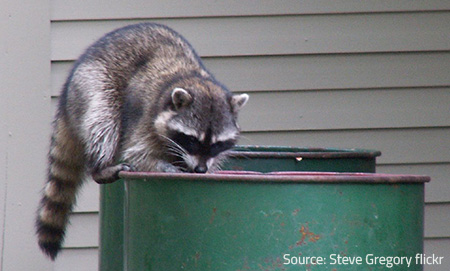
Let me see what tasty stuff you have thrown out today…
The raccoon is among the most troublesome mischief-makers. They are crafty nocturnal animals that commonly eat fruit and nuts but also enjoy pet food and frequently rummage through garbage cans for leftovers. Raccoons are excellent climbers that are really strong for their size, so they can cause plenty of damage to your property. They tend to make holes in fences, walls, and roofs to get inside, but are clever enough to use pet doors and windows as well. Raccoons will tip over trash cans and tamper with patio furniture or playthings in your yard. If you have a pool, expect the mischievous intruders to poop in it and if you have decorative fish in your pond, the little gluttons will surely eat it. Raccoons usually rip up ducts and wires, tear the insulationInsulation is a material used in buildings to reduce the tra... More, chew on the wood joists, and enjoy several other harmful activities. The worst part, however, is that they bring in parasites and pose a variety of bio-hazardous threats. So, even if you are willing to spare some of your pets’ food for a hungry animal, you still need to get rid of raccoons for health reasons.
The best raccoon control method is, of course, to prevent the animals from entering your property. If, despite your efforts, they start nesting in your attic or chimney or inside the walls, between the floors, or under your porch or shed, raccoon trapping and removal is your only option. And it would better be done by experts.
How To Prevent Raccoons From Entering Your Home
Repellents Usually Don’t Help
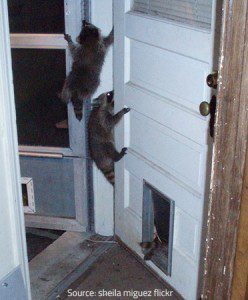
Raccoons are famous for their resourcefulness: if there is a way in, they will surely find it.
The classic repellent ingredients such as naphthalene, ammonia, or predator urine yield no satisfactory results. Raccoons do not fear dogs, not even humans, so it is really difficult to scare them away from your property. Spraying certain repelling smells (cayenne pepper and chili boiled in water, for example) may temporarily do the trick but do not expect miracles.
Blocking Access Points Is Just A Temporary Solution
Raccoons are very skillful and can rip open various materials to get inside your home. Wood or paper screens, broken vents and duct work, open chimneys, windows left ajar, pet doors, and any holes at least 3 inches in diameter will allow access to your property. If you manage to secure them all, you may succeed in getting rid of raccoons. A cap over the opening of your chimney, a tight lid on your garbage can, a strong fence, and a solid roof will certainly discourage the animals from entering your home. Keep pet food inside, lock the doggy doors, place spikes around the pool, and bring the bird cages inside. Then raccoons will probably lose interest in your residence.
If you discover a hole, you can successfully close it off using metal meshing and adequate foam. However, the little rascals will probably find a way to make another opening.
Cleaning Up Could Solve Your Raccoon Problem
Pet food or bird seed left unattended in your yard or porch present a very tasty invitation for the furry pests to visit your place. So, discourage the intruders by keeping any food inside.
Be sure to clean up your property really well:
- Remove any paper and rotting fruits from your yard;
- TrimTrim is the decorative or functional molding used to finish ... More trees, shrubs and weeds;
- Carry away any wood piles and trash piles;
- Close your trash cans tight and empty them regularly;
- Wash garbage cans with a hose from time to time – they will not smell of food and will not attract raccoons;
- Make sure there are no crumbs or anything edible left outside your house before the night falls.
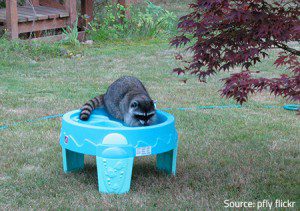
What a rare sight! A raccoon washing its paws before breakfast.
Bright lights around your clean and tidy house, together with the scent of ammonia or bleach may actually drive raccoons away.
How To Get Rid Of Raccoons
Cute and talented as they are, you cannot have pet raccoons because their temper does not allow training or devotion to humans. Despite your love for animals or respect for wildlife, if raccoons are nesting in your home, there is no room for doubt – they can cause great damage, so you need to remove them as soon as possible.
Raccoon Trapping
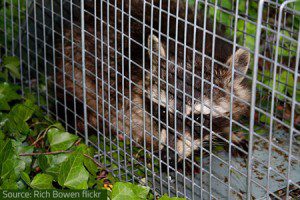
Trust raccoon removal experts to get rid of the furry intruders in a humane way.
Trapping the wild animal is the best way to get rid of it, but doing it yourself is very risky and difficult. First of all, you need the right type of trap – large and sturdy enough to hold a strong and canny raccoon. If the device is not good enough, the little beast will manage to destroy it and escape.
Also, there is a good chance that you catch somebody’s pet, a stray cat, an opossum, or some other creature you never intended to. Be careful not to allow an animal to suffer or die in your trap.
Select very thoughtfully the location of your trap: set it near a cable or a wire and the raccoon will manage to reach through the cage and rip it up; set it near a screen and the latter will be soon shredded by sharp claws; set it near a pool and you will probably find the trap in the water and the raccoon drowned. Trying to set the trap on the roof is not a good idea because it is not safe. However well you plan your trapping strategy, the fact is that a raccoon will often prove to be resourceful enough to avoid it.
You should also have it in mind that trapping wildlife is illegal in the majority of the states. A proper license is required for removing critters, so calling professional help is definitely the safer and much more effective method.
Raccoon Removal
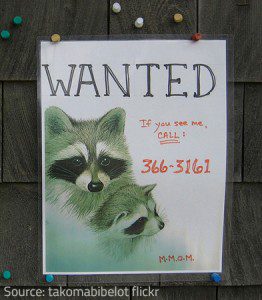
Baby raccoons need their mothers too!
Even when you manage to catch the intruder, you may have quite a problem relocating the animal. If you leave the trapped raccoon for a long time in the scorching summer sun or the freezing winter cold, it will suffer and die. Raccoons will bite you badly and scratch you deeply if given the opportunity while you are moving the trap. Besides, if released in the woods, they are clever enough to find their way back regardless of the distance. Worst of all – they will have learned the harsh lesson and will not fall into a similar trap again. Just killing the trapped animal is, of course, inhumane and out of the question.
Raccoon control specialists are experienced and properly equipped for safely trapping and removing the pests without using poison and other dangerous or inhumane methods. Wildlife removal professionals also offer repairRepair is the act of fixing or restoring damaged property, m... More and clean up services for the damaged areas, as well as the much needed deodorization. They will usually provide exclusion methods to prevent raccoons from causing problems again in the future. So, think well and choose the option that suits your situation the best.
However, if you have a raccoon in the attic, make sure to avoid dealing with it by yourself. This will most likely be a mother with a nest of young ones.
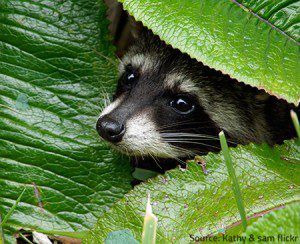
Dear raccoons, steer clear of our homes.
The babies will be hidden well and if you trap and remove the adult raccoon, you will probably never find them. The little ones will suffer and die, causing horrible stench and a bio-hazardous threat. Or, if they are old enough to leave the nest, the damage caused by the scared inexperienced youngsters will far surpass the typical trashing of your property. So, remember that getting rid of raccoons in the attic without professional help is definitely not recommended. Act with consideration for the wild animals and for your own well-being as well!
Wildlife belongs to the wilderness, not to our domestic environment.











